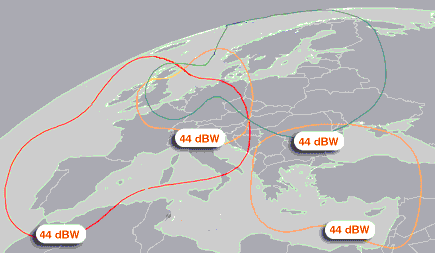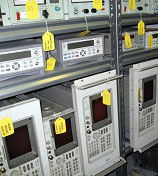25 new IT companies to watch
Posted by
world Jr at Friday, November 5, 2010
The next generation of IT vendors has arrived on the scene. Driven by a tentative economic recovery that is seeing venture capitalists release a few more dollars to tech startups, and a need to create tools for the world of cloud computing and virtualization, a flood of young technology companies is hitting the market.
One startup you've never heard of might end up being the next Intel or Microsoft. Others may force changes upon established vendors that have gone stale, which will have to innovate themselves or purchase startups that have a brilliant idea the big guys haven't thought of. Still others may simply fade into the tech industry graveyard, never to be seen or heard from again.
At Network World, we've identified 25 IT startups that we think are worth watching. These startups have recently released their first products or remain in stealth mode, and typically have financial backing from venture capitalists.
Most of these startups, in one form or another, are attempting to fuel the shift from static IT infrastructures to virtualized data centers and cloud networks. Analysts say the biggest opportunities may be in software that can manage, secure and accelerate cloud-based and virtualized systems. However, a few brave companies are building new hardware products that compete against the Intel/AMD monopoly in the chip market.
The shift to cloud computing and virtualization is not unlike the shift from mainframes to PCs several decades ago, an era that saw the rise of giants like Intel and Microsoft but also the demise of several mainframe vendors not named IBM, says Zeus Kerravala, an analyst with the Yankee Group.
But predicting which new company will distinguish itself and join the class of IT giants, like VMware did a decade ago with innovations in virtualization, is nearly impossible. The window of opportunity will be short -- particularly in the hardware market -- because billion-dollar vendors such as Oracle, IBM, HP and Microsoft will jealously guard profit margins, and try to push out new competitors by swallowing them up or replicating what startups have created.
It's often easier for small companies to innovate, says Robert Armstrong, a financial analyst and senior columnist at Dow Jones Investment Banker. But established vendors are so good at marketing and sales, and IT customers are so conservative that "just having a better product" isn't enough "to break the iron grip of the incumbent," Armstrong says.
Network World's 25 New IT Company to Watch include companies that improve the performance of cloud-based applications and storage, add extra layers of security to e-mail and Web sites, accelerate network traffic, relieve the data access logjams that mar virtualization and other IT projects, create Amazon-like private clouds behind the firewall, and provide disaster recovery optimized for virtualized data centers. Others tackle the data center energy problem with software tools that monitor energy use, and new server chips based on low-power architectures.
One startup is even building its own LTE-based 4G wireless broadband network to fuel the next generation of smartphones for consumers and enterprise customers. That would be LightSquared, which has more than $3.5 billion in debt, equity financing and assets contributed by Harbinger Capital Partners, as well as deals with Nokia Siemens Networks and Nokia itself to build the network and devices for it. LightSquared services will debut next year in Denver, Baltimore, Phoenix and Las Vegas. Satellite coverage will extend nationwide, and the wireless broadband network is expected to cover at least 92% of U.S. consumers by 2015.
The data center energy crisis
Let's take a look at the rest of the 25 startups in more detail, starting with two vendors building server chips with the aim of solving the data center energy crisis: Smooth-Stone and SeaMicro.
Backed by plenty of venture capital and a $9.3 million grant from the U.S. Department of Energy, SeaMicro says its servers consume 75% less power and space than traditional machines. The SeaMicro SM10000, which goes for $139,000 and up, uses 512 low-power Intel Atom processors connected by a fabric that provides throughput of 1.28 terabits per second, along with a design that decreases the number of motherboard components by 90%. The servers are "specifically optimized for the workloads and traffic patterns of the Internet," the vendor says.
The stealth mode Smooth-Stone, meanwhile, has $48 million in venture funding and is building low-power alternatives to Intel and AMD chips that use smartphone microprocessors. Low-power chip development is frequently targeted at the mobile phone market, since the devices rely on short-lived batteries.
"It's not a proven concept yet," Armstrong says of using smartphone chips in servers. But there is a huge unmet need in the area of low-power servers, and while Intel and AMD are jumping on the bandwagon, the power problem has increased faster than expected, he says.
"The incumbent vendors have been less fast than you would expect in providing provide people with a solution to this problem," Armstrong says. "The limitation in many data centers at this point, in terms of ability to process information quickly, is not the computers -- it's literally the power cord going out to the grid. It's literally 'we can't get enough electrons into this room.'"
The data center energy problem is also being tackled by the likes of JouleX. With ISS co-founder Tom Noonan as its CEO, JouleX launched out of stealth mode at this year's Interop Las Vegas conference, with software that simplifies IT energy management by automatically discovering all network-connected devices -- from servers to HVAC and lighting systems -- and identifying opportunities for power savings.
JouleX makes it easier to monitor energy use because it doesn't require agents to be installed on every monitored device.
"There's not a business we're familiar with that is asking 'can we have another agent to install on our PCs and servers,'" says JouleX vice president of sales and marketing Tim McCormick.
Customers such as Siemens, Equifax and BMW have hopped on board the JouleX bandwagon, and why not? Noonan and partners sold ISS to IBM for $1.3 billion in 2006, and Noonan believes energy is one of the few IT issues that can rival security in its importance and scope.
Cloud security
But controlling energy use is far from the only major problem facing IT as it moves toward networks that are heavily virtualized and reliant on cloud-based services. Security -- no surprise -- is still top of mind, with IT pros surveyed by Forrester calling it the biggest concern preventing them from adopting software-as-a-service (SaaS).
Most startups will tell you security is baked into their product, no matter what part of the tech industry they're in, but a few of Network World's New IT Company to Watch are tackling cloud security more directly.
CloudFlare has built a content delivery network that acts as a cloud-based firewall, as well as a network traffic accelerator, blocking threats and limiting bots and crawlers to improve security and decrease stress on bandwidth and server resources.
CloudFlare wants to expand the market for CDN services by "bringing the performance and security tools previously available only to the Internet giants to anyone with a Web site," and has gained great interest since the launch of its public beta a month ago.
The CloudFlare network was on pace to serve 350 million page views and 25 million unique visitors in October, CEO Matthew Prince says. Despite its current focus on small Web site operators, CloudFlare is in discussions with enterprise users and plans to launch an enterprise-focused service in Q4 2011.
Another security-minded startup is Truedomain, whose cloud-based e-mail authentication service is designed to block phishing e-mails, protecting legitimate domain names from being used for fraud. Truedomain relies on industry standards like DKIM (Domain Keys Identified Mail), and SPF (Sender Policy Framework), and provides reporting and analytics tools "to give e-mail senders direct insight into e-mail authentication results, phishing and spoofing activity and delivery performance."
We've all dealt with spam, even if we haven't been taken in by a phishing attack or identity theft, so anything that cuts down on junk messages is a good thing. From a business perspective, a service like TrueDomain's could help large e-mail senders restore the trust consumers once had in them. We'll still be suspicious of poorly written e-mails from "eBay" and our bank, however.
One big area of concern regarding cloud security is storage, of course. For now, cloud storage may remain off-limits for the most sensitive data, but a startup called Oxygen Cloud -- a subsidiary of LeapFILE, a provider of secure file transfer technology -- is helping businesses use cloud services to securely share and collaborate on files. The Oxygen Cloud service, now in beta, lets enterprises build a "hybrid storage solution" combining different public and private clouds, while applying AES 256-bit encryption to data in transit both in the cloud and on local devices.
While Oxygen Cloud's standard service combines a Web-based platform with a desktop client, the company will also deliver its technology on local hardware through a partnership with Data Robotics. Oxygen Cloud is so named because the service supposedly "breathes life" into files.
Building the private cloud
Businesses that worry about the security or performance and availability of public cloud services are in some cases opting to build private clouds, which are generally defined as highly virtualized networks that allow the delivery of IT as a service, potentially with developers and end users provisioning their own resources through self-service portals.
Vendors tend to slap the private cloud label on any old IT product, but a couple of newcomers among our New IT Company to Watch have built private cloud software that may be worthy of the name.
Chris Pinkham, who led development of Amazon's Elastic Compute Cloud, is the founder of Nimbula, whose software automatically organizes virtual servers into an Amazon-like private cloud that operates behind the enterprise firewall. Nimbula Director, available in beta and slated to be generally available later in 2010, lets customers offer virtual machine instances in any flavor they like, from Linux to Windows, while setting policies that determine how much compute and storage capacity VMs can consume.
One of Nimbula's early customers, CIO Joubert Steyn of the Metropolitan Health Group, a health insurance company in South Africa, says he opted to build a private cloud because "South Africa is still quite bandwidth-constrained." Even for customers with enough bandwidth to use public cloud services, software products such as Nimbula Director can drive up utilization rates of existing in-house resources and improve services for developers.
Our second private cloud startup is the aptly named Cloud.com, which secured the highly coveted domain name for its launch in May of this year.
Available now, Cloud.com offers open source infrastructure-as-a-service software that helps service providers and enterprises turn physical and virtual resources into cloud computing services. The software, CloudStack, runs on top of the VMware, Citrix XenServer and KVM hypervisors, creating computing pools consisting of VMs, storage and networking capabilities, accessed through self-service interfaces for both administrators and users.
CloudStack is compatible with common cloud frameworks like Amazon's API, Citrix Cloud Center and VMware vCloud, potentially allowing portability of applications between private data centers and cloud. While the open source version is free to use, Cloud.com offers additional features and commercial support to paying customers, starting at $10,000 per year for five nodes. Cloud.com has some early support from Microsoft, as the two companies are collaborating on making Hyper-V compatible with open source cloud software.
Data access and performance
Data access and application performance are huge issues in virtualized and cloud-based workloads, and a whole slew of Network World's New IT Companies to Watch are working on these problems. Most of them, for whatever reason, have names starting with the letter "A" (startups often choose either A or Z names to get at the beginning or end of lists such as this one).
AppDynamics makes software that manages the performance of distributed Java and .NET applications, making it easier for IT pros to identify and fix problems in Web apps. The software works both on local applications as well as those running on Amazon EC2 and VMware-based clouds.
AppFirst, meanwhile, makes a SaaS product that provides IT pros with visibility into applications, identifying the server, server processes and activities causing performance problems. AppFirst says its service can analyze the "behavior and performance of applications across the entire application stack, regardless of language, application type or location (cloud, physical or virtual servers)."
Then there is Aryaka. Led by CEO Ajit Gupta, who previously sold Speedera Networks to Akamai, this startup has just launched a cloud-based application acceleration and WAN optimization platform, using TCP optimization, bandwidth scaling techniques, and application proxies to improve app performance and reduce bandwidth needs. Aryaka also boasts "enterprise-grade IPSec security."
Startups such as these could help businesses get over some of the performance problems posed by moving workloads to cloud services.
Cloud computing and virtualization "put a lot of demands on the network," Kerravala says. It takes a long time to move 10GB of data across a WAN link, and there's tremendous potential for startups that speed up that process, he notes.
That's why a company like Translattice, a startup whose technology goes into general availability Nov. 1, has built an appliance that improves access to applications and data for distributed and mobile workers. The appliance is fueled by a distributed relational SQL database that moves data closer to where it is likely to be used. "The Translattice platform is a distributed global application architecture that anticipates workers' application and data needs based on organizational policy and past usage, delivering the information when and where it is needed," the company says, adding that these benefits can be extended "even to small and remote offices."
Infineta Systems, another New IT Company to Watch, will offer the Velocity Dedupe Engine, a WAN traffic accelerator that uses de-duplication and other techniques to reduce the network traffic going over WAN links by up 80% or 90%, as well as transport layer optimizations and a prioritization engine to ensure that critical traffic is accelerated. The technology supports 10Gbps connections and could speed up, for example, live migrations of VMs from one data center to another.
Infineta's technology won't be generally available until Q1 2011, but the startup says it's already had talks with a few dozen Fortune 500 companies that are looking for ways to handle rapid growth in WAN traffic across data centers.
Databases
No startup is likely to overtake Larry Ellison's high-flying Oracle, but several new companies have innovative approaches to the database market. Akiban, whose AkibanDB product will come out sometime in 2011, has created database virtualization software that improves performance of SQL applications, in an attempt to solve the problems that lead customers to "NoSQL" products. The goal is to preserve investments in SQL-based applications by restructuring the way data is organized and accessed with "predictive caching" and other techniques that relieve bottlenecks caused by random access calls and join operations.
Delphix, whose Delphix Server technology is already shipping, provides database virtualization, storage optimization and management software designed to improve efficiency of storage used by Oracle and other databases. Delphix uses "intelligent block management, intelligent block sizing, compression, de-duplication and database filtering technologies" to reduce storage needs, and reduces time needed for database provisioning and refreshes without disrupting production systems. Delphix itself installs on an x86 server or virtual machine; database servers such as Oracle "simply see Delphix Server as a storage target."
Membase goes a different route than Akiban with a NoSQL database management system that includes and builds upon Memcached, a distributed memory caching system that's widely used by many large Web properties. Membase Server, a commercial distribution of open source software that's already powering the online game "Farmville," is designed to improve scalability and performance of Web apps while reducing the complexity of data management.
Membase officials say Memcached "is a key ingredient in the scale our data architecture behind 18 of the top 20 most heavily trafficked Web sites (including Google, Facebook, Twitter, YouTube, Wikipedia and Craigslist) and tens of thousands of other corporate and consumer web applications." Analyst Curt Monash of Monash Research notes that Membase is targeting a potentially huge market in the hopes that such large Web properties will use its software to improve performance of Memcached.
The Membase open source project began last year as a collaborative effect involving Zynga, the creator of online games such as FarmVille and Mafia Wars.
The next generation of storage
Storage bottlenecks have become a problem in data centers that are heavily virtualized, and customers looking to adopt cloud storage have struggled with performance and security. That's where this next group of startups comes in.
Cirtas, whose Bluejet Cloud Storage Controller is shipping for $70,000 and up, lets enterprises offload less frequently used data to the cloud while keeping high priority data in-house for optimal performance. The 2U appliance caches high priority data locally and stores secondary data in cloud services using WAN optimization technology, letting customers access cloud storage with performance and security in mind. The appliance combines DRAM, solid state drives (SSDs) and 7200RPM hard disk drives for multiple tiers of storage and up to 3.5TB of internal capacity.
"Cirtas claims they basically make the cloud look local to the applications," says analyst Arun Taneja of the Taneja Group. "That's the magic" -- customers get local performance with the price and flexibility of cloud computing.
Gridiron Systems, meanwhile, built a SAN application accelerator designed for large databases, VMware deployments, Oracle and general file acceleration. Gridiron uses MLC (multi-level cell) flash chips to provide "the performance and read/write ability of RAM with the capacity of Flash," speeding up access to application data sets.
Gridiron Systems officials claim to be in stealth mode and won't reveal pricing except to potential customers. However, the company seems to be stealth in name only, as it has been shipping production deployments since June and offers detailed information about its technology on its Web site.
On the virtualization front, the startup Virsto is speeding up access to data for virtualized systems, particularly those relying upon Microsoft's Hyper-V hypervisor. Virsto's storage virtualization software installs into the hypervisor and manages its interaction with storage, improving the efficiency of data access operations in an attempt to eliminate the I/O bottlenecks caused when virtual servers try to access storage systems.
VMware has done a relatively good job optimizing storage, which is why Virsto is focusing on Hyper-V. "Microsoft needs more help" because its virtualization technology is newer than VMware's, Virsto CEO Mark Davis says.
While VMware is still the king of x86 virtualization, Hyper-V is becoming a viable alternative and its market could expand greatly because of the vast Windows Server install base.
One more storage startup, Virident, is addressing the fast-growing demand for enterprise-class flash drives.
"Flash, and successor solid state technologies, will revolutionize storage and the rest of the hardware stack," Monash predicts.Virident makes a PCIe SSD storage system that delivers low-latency data access for I/O-intensive applications, such as databases. Virident isn't the first startup in this market, as it will have to contend against the likes of Fusion-io, which has Apple co-founder Steve Wozniak as its chief scientist. But Virident is claiming to offer faster performance with at least 200,000 IOPS (input/output operations per second), and disk lifetime of 24 years, assuming 5TB worth of writes per day.
Nimble Storage is also targeting the virtualization and SSD markets with converged iSCSI storage, backup and disaster recovery products that combine fast SSD storage with inexpensive SATA drives to give customers primary and backup storage in one device, while also providing offsite replication. Nimble improves storage efficiency with thin provisioning and other features, and is optimized for VMware virtualization deployments and Microsoft applications such as Exchange, SharePoint, and SQL Server.
Network virtualization and disaster recovery
Earlier in this article we noted that VMware became an IT giant by virtualizing the commodity x86 server. One of our "stealthiest" startups is trying to virtualize the network in much the same way VMware virtualized servers.
Nicira Networks, with financial backing from VMware co-founder Diane Greene and a patent-pending network operating system, aims to treat physical infrastructure as a resource pool of capacity, and create logical representations of that capacity which are decoupled from physical infrastructure. If successful, Nicira believes it can "free data center networks form the tyranny of inflexibility, complexity, vendor stranglehold, and high costs."
Nicira isn't saying yet when its technology will be available. Today's virtualization technology, however, is in wide use and provides new opportunities for data center managers to improve disaster recovery. That's the market addressed by our final two New IT Companies to Watch: ZeRTO and Actifio.
Still in stealth mode, ZeRTO is revealing little more than that it is developing disaster recovery/business continuity software aimed at the needs of virtualized, mission critical applications and cloud deployments. CEO Ziv Kedem previously co-founded Kashya, a company acquired by EMC and turned into EMC's RecoverPoint data protection and remote replication product.
ZeRTO is accepting applicants for a private beta program.
Actifio, meanwhile, is attempting to simplify disaster recovery and data protection with software that combines storage virtualization with several other capabilities. The software "integrates capacity optimization with data de-duplication, compression, encryption and network usage optimization," to automate the copy, store, move and restore operations, while helping IT deliver a service catalog with defined SLAs.
Actifio's Data Management Virtualization technology is available now at prices starting at $100,000.
Actifio -- similarly to startups Nimble Storage and Infineta -- is combining several technologies together in unique ways in what Taneja likes to call the "technology blender."
Blending technologies together to solve multiple problems at once may be a good approach for today's complicated IT world. But it's not the only way to break into the enterprise data center, as these 25 startups are showing.
How many of these startups will turn their technologies into successful business models is an open question. But in most cases these startups are gaining significant funding from venture capitalists, a hint that they might be on the right track.
Although the venture market in 2010 is better than it was in 2009, the funding available to tech newcomers has greatly declined over the past decade, leaving money for only the best new companies.
As Armstrong puts it, "There are a lot of bad ideas getting weeded out."
source: www.computerworld.com.au













